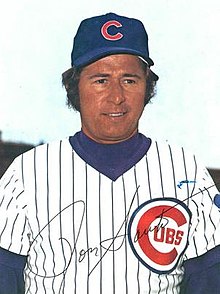
July 9, 1998; June 15, 1999 – The childhood and adolescence of Ron Santo were anything but idyllic. His father was an abusive alcoholic, his parents divorced when he was six, and he was diagnosed with diabetes at the age of 18. Nevertheless, a combination of iron-willed resiliency and natural talent enabled him to overcome these adversities and become one of the greatest players in Chicago Cubs history and a Hall of Fame inductee.
Ronald Edward Santo grew up in the Italian district of Seattle known as “Garlic Gulch.” Signed out of high school in 1959, a year later, on June 26, 1960, the 20-year-old third baseman was in the Cubs’ starting lineup, where he would remain for 14 seasons. Traded to the Chicago White Sox in 1974, Santo retired at the end of that season.
In spite of playing his entire 15-year major league career while afflicted with diabetes, Santo was a nine-time All-Star and a five-time Gold Glove winner who hit 342 homers and drove in 1,331 runs. He was one of only four players over that span who had 2,000 hits, 300 home runs and 1,300 RBIs. The public remained unaware of Santo’s illness until he revealed the news on “Ron Santo Day” in August 1971, when he began a lifelong commitment to raising funds for the cure of juvenile diabetes.
Following his retirement, Santo became a successful businessman before returning to the Cubs in 1990 as a radio color analyst. Beloved by fans for his unbridled enthusiasm and blatant rooting for the Cubs, he held the job until his death in 2010 at the age of 70. In 2003 the Cubs retired his uniform number 10 and in 2011 they erected a statue of him outside Wrigley Field. In 2012 he was elected to the Hall of Fame by the Veterans Committee.
No less impressive than his on-field achievements was the way he responded to a series of health issues that plagued him over the last decade of his life, which included heart surgery, amputation of both legs below the knee, and cancer. We would often speak during those years when the Cubs came to Milwaukee and I was always impressed by his positive attitude, courage, and self-deprecating sense of humor. There was no hint of self-pity, even in the face of afflictions that would have kept most people at home.

